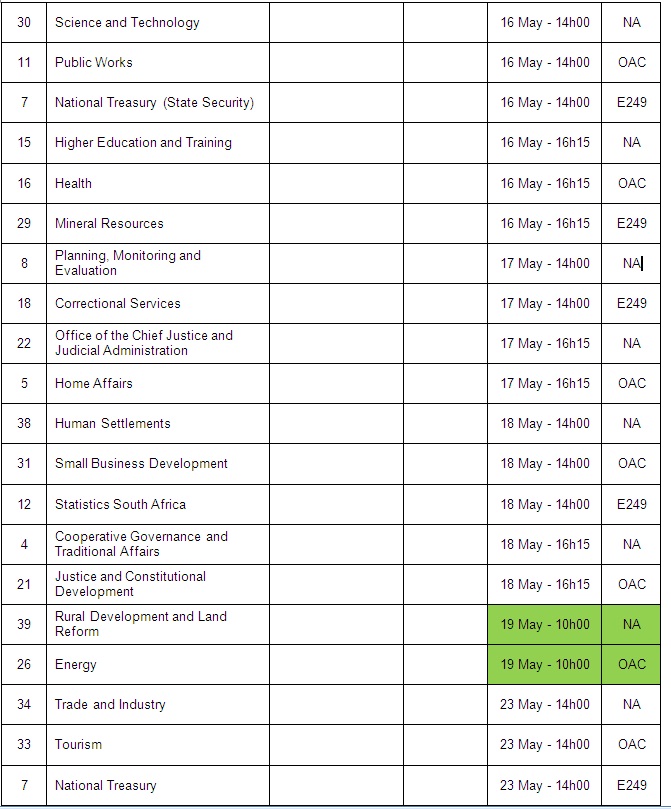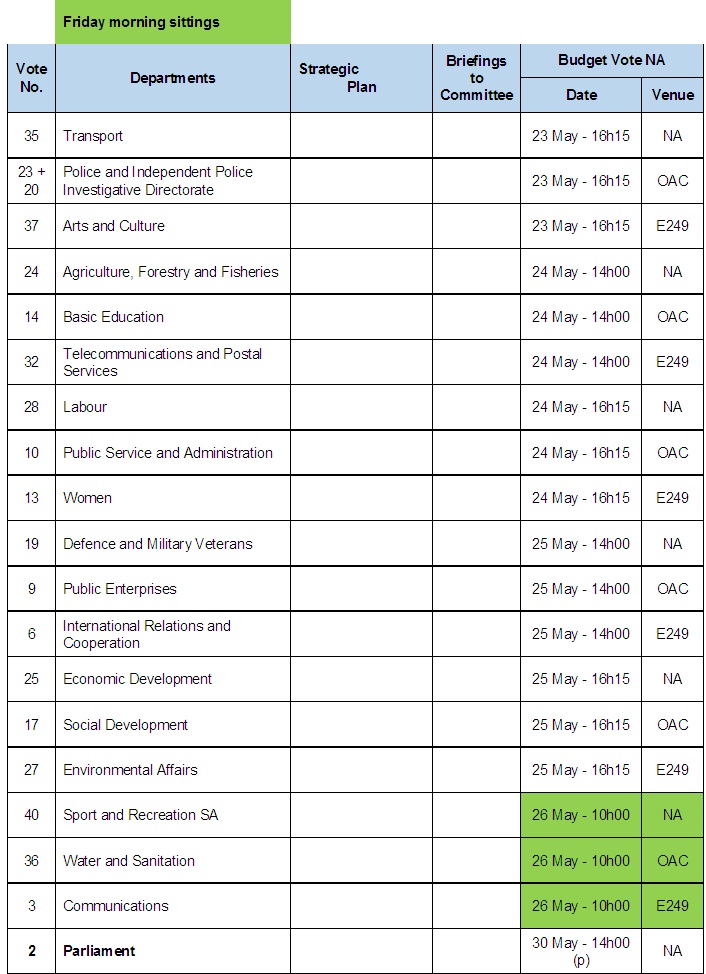Parliament returns from recess this week. The second term will run for 9 weeks and will be packed with activities. Some of the highlights include committee, oversight and legislative work; oral questions to the executive; a possible motion of no confidence debate; NCOP Oversight Week and passing of the national budget.
In addition, the national legislature has provisionally scheduled two joint sittings to debate and commemorate Africa Day and Youth Day. That said, the timetable is pretty fluid and the plan can be overshadowed and overtaken by unscheduled debates, statements and events.
It will be anything but a gentle start as MPs get stuck into the gruelling budget vote process. This ritual – which will consume most of this term - includes meetings with various departments and entities on their strategic plans, annual performance plans and budgets for the financial year. Committees then have to prepare a report for consideration by the House. This will be followed by the budget debates in the mini plenary sittings, and conclude with consideration of the Appropriation Bill by the NA and the NCOP.
The Money Bills Amendment Procedure and Related Matters Act gives Parliament unrestricted power to change the fiscal framework, the Division of Revenue (Division of Revenue Bill) allocations, and tax policy. However, these changes must be made by following a set order of engagements with different parts of the budget. This is to ensure that: changes to allocations are in line with the fiscal framework, a large number of changes do not result in an unsustainable fiscal policy stance and the overall sustainability of the budget is not put at risk.
One of the regular criticisms about this process is that the timeframes are very short and that meaningful public engagement on very important Bills does not take place. In order to address this, the finance committee was tasked to review the implementation of the Money Bills Act; specifically to look into the time frames and sequencing associated with the different financial instruments and bills, and the parliamentary procedures related to them. The committee has not concluded its work and a revised law is only likely to come into effect later in the year during the MTBPS process.
In between, there will be some heavy legislative lifting as there are nearly 40 bills before Parliament with more in the pipeline. Some bills interrupted by the constituency break will resume their path to becoming law. The major ones include the Mineral and Petroleum Resources Development Amendment Bill, Refugees Amendment Bill and Protected Disclosures Amendment Bill.
Other leftover bills cover an array of issues, including red tape, border management, unemployment insurance, public service, immigration, land tenure, land expropriation, and liquor products.
Also on the radar is the rescheduled motion of no confidence debate. Parliament agreed to postpone the debate, which was initially set for 18 April. The Speaker stated that the debate would be postponed 'pending consideration of the matter by the Programme Committee after the constituency period'. The opposition’s motions of no confidence in President Jacob Zuma came as a result of the latest Cabinet reshuffle‚ which saw the removal of former finance minister Pravin Gordhan and his deputy‚ Mcebisi Jonas. Two of the three ratings agencies subsequently downgraded South Africa’s long-term foreign currency sovereign rating from investment grade to “junk”. Meanwhile, the UDM approached the Concourt to request that the motion of no confidence be decided by secret ballot. There’s been a lot of discussion and plotting about how the vote will go and the noise will ratchet up again when a new date is set and if the court decides in the UDMs favour.
The cabinet reshuffle means that a lot of people have to get used to new jobs and portfolios. In addition, there will be new faces in Parliament following the resignations. Some will have time to find their feet while others will be expected to hit the ground running. It will be interesting to observe what impact, if any, these changes will have.
Turning to this week, there are no sittings scheduled in the NA Chamber. However, the main chamber in the NCOP has arranged 2 sessions – it will consider regular business such as motions, reports, legislation and debate including a debate on Workers’ Day.
Elsewhere, the Committee corridor is a one-trick pony this week with almost all committees considering strategic plans and budgets. Nonetheless, we can expect an impressive array of cabinet ministers to be present during these engagements. Here is a selection of the stand out meetings:
On Tuesday, the Standing Committee on Finance will be briefed on Tuesday by Parliament’s Legal Services on the Money Bills Procedure and Related Matters Act and will deliberate on the act.
The Select Committee on Finance will deliberate on the Financial Sector Regulation Bill.
On Wednesday, a joint meeting of the Portfolio Committee on Higher Education and Training and the Select Committee on Education and Recreation will receive a briefing from the National Student Financial Aid Scheme on the roll-out of the new Student Centred Model.
The Portfolio Committee on Cooperative Governance and Traditional Affairs will on Wednesday be briefed by the Department of Cooperative Governance on the Constitutional Court judgement of the Local Government: Municipal Systems Amendment Act (Act 7 of 2011).
There will be a joint meeting of the Standing Committee on Finance and the Portfolio Committee on Trade and Industry will hold public hearings on transformation of the financial sector.
The Programming Committee will meet on Thursday.
See the full schedule of meetings here:



Comments
Keep comments free of racism, sexism, homophobia and abusive language. People's Assembly reserves the right to delete and edit comments
(For newest comments first please choose 'Newest' from the 'Sort by' dropdown below.)